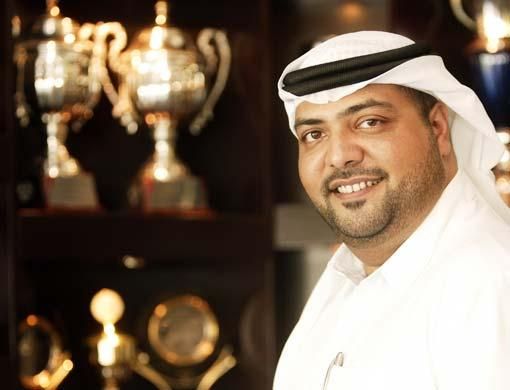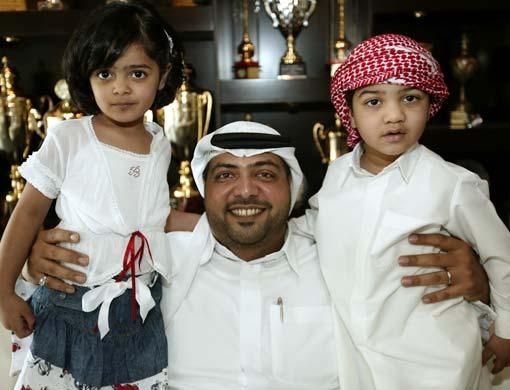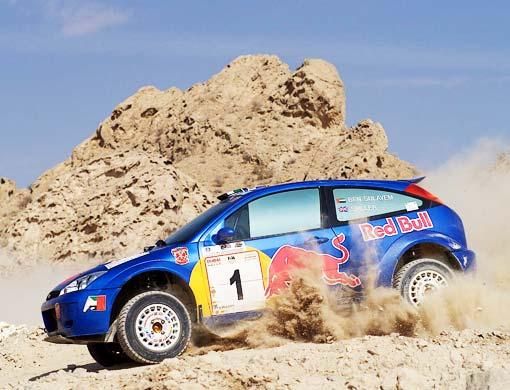Contrary to popular belief, rally driving isn't a risky business. In fact, it teaches you your limits, says Raed Ahmad Baker, a UAE national, who also runs a thriving jewellery business.
By day he is basking in the glow of ultra luxe jewellery, overseeing a business spread across Dubai's many malls.
But come weekends, Raed Ahmad Baker, conservative scion of one of the UAE's most respected business families, transforms into a modern-day dune tamer, gliding over sand dunes in his turbocharged Range Rover.
A rally car driver for 11 years, Baker, chairman of Liali Jewellery, has won the UAE Championship open class three times and cross country twice. Just last month Baker participated in the 1,000 Dunes Middle East Rally.
One of the most successful Arab rally drivers (having participated in 63 rallies and won 47), he has raced in international events held in Qatar, Bahrain, Spain and Canada.
"Growing up in the UAE (when such development was yet to come) we did not have anything to do to pass our time," he says.
"All we had was our father's car and the desert around us. I soon developed a heavy right foot!"
Blessed with the fearlessness of youth and an encouraging group of mates, Baker began to hone his skills, learning to drive as fast as he could. "It is surprising how driving in the desert teaches you so much," he says.
His friends encouraged him to take his love of cars to the next level and participate in a rally. One of his friends directed him to the Emirates Motor Sports Federation, where he registered for his first rally.
The rest is history. Baker's rallying career began that day in 1996 when he took to the wheel for the first time in the 1,000 Dunes Rally aged 21. He finished ninth among 15 contestants, but was given the first beginner's award for finishing the rally.
Baker recalls, "It was quite an achievement since the 1,000 Dunes is known to be the most difficult rally in the Middle East. After participating in the event for seven years, I finally won it in 2003 thanks to some hard preparation. Even before this win, I always finished at podium positions."
He confesses that he has learnt a lot from other drivers. "Everyone knows how to drive a car, but not everyone can race. It is an art by itself. I also attended many rallies and racing schools to understand this skill."
Baker came to prominence by beating many seasoned drivers in the following seasons and he continued to impress by claiming six category wins in the 1,000 Dunes to date.
He also bagged the most valuable team award in 1997, 1998 and 2004. He represented the UAE at the Race of Champions held in Jeddah in 2001 and 2002.
When he meets us, he is just recovering from a bout of severe dehydration after the last gruelling rally. Yet he must be at work as he heads a growing business.
As the man behind Liali Jewellery, a Dubai-based jewellery retailer, he confesses to being a workaholic ("There's no choice, I am self-sponsored," he says with a wry grin).
Started in June 1999 by Baker and Anuraag Sinha under the umbrella of Dutco Group of Companies, Liali has 15 outlets in malls and shopping centres across the UAE.
They retail premium jewellery brands including Vivienne Westwood, Green G, Miluna, Tirisi, and Liali Memories.
Even as he races to the top, Baker confesses he is extremely risk averse and prefers caution over flamboyance.
He lives by a simple credo of humility and self belief - an approach that should help him take the chequered flag in all his endeavours.
As he says, "I have learned a lot about myself by rally driving. It has shown me my mettle. It has taught me to be patient - that there is a time and place for everything. If I didn't race, I don't know if I would be the man I am today.
"I enjoy life. And contrary to popular conception, I do not live on the edge. I know my limits, take a lot of precautions and avoid risks. My self-belief and confidence comes from this approach."
I
I think racing is an art. Everyone knows how to drive, but not everyone is a racing driver. The best analogy I can think of in this context is that I know how to draw a face, but I can't paint the Mona Lisa. That can only be executed by an artist like Leonardo Da Vinci.
So far I have participated in 63 rallies and won 47 of them. What more can I say? I have had great success in motor sports with God's help. There have been four years in my life which have been the most successful: 1999, 2000, 2001 and 2003, when I came first in the 1,000 Dunes.
When I am behind the wheel, I feel fear, anxiety, happiness and a knot of tension in my stomach - all these are experienced in their entirety before the word 'Go'. And once I'm off, it's pure 200 per cent concentration on the task at hand. I don't think of anything but what I'm doing right then.
Am I afraid of what might happen should anything go wrong? Yes, of course. Fear is what keeps me safe. I never take chances. Everything I do has been predetermined and planned. Yes, some things you can't predict - and that is where experience kicks in.
I do experience road rage while driving in Dubai, but I save my angst for the next race that I am participating in. On the whole, I am a very polite driver. I make concessions to the fact that the other person might be having a bad day.
The best business advice I ever got? My father once told me, 'Don't go to sleep when you are in debt. And never postpone something for tomorrow when you can do it today.'
Me
Me and my young days:
I was born in Dubai, the youngest of three brothers and five sisters. I spent my childhood in an era when there was an old Dubai and a new one, and I witnessed, first-hand, the development of the city. I grew up in Deira and at the time there were no shopping malls or cinemas there, just a few roads and lots of sand.
It was a peaceful life and amazingly, we were never bored! We tried to amuse ourselves as much as we could with whatever was at hand - and that was basically the desert all around and my father's cars.
The car he would let us drive was a 1978 Datsun, a 4WD - the first car I ever drove in the sand. I then drove Land Rovers and Range Rovers - and all these before I got my driver's licence, when my feet barely touched the pedals.
I started driving when I was 11 and never left the driver's seat after that. Among my brothers, who were much older than me, and my friends, driving was (considered) cool.
I had plenty of accidents as well. You learn from your mistakes. There were many close calls, when I spent time in hospital as well. But despite our family's protests, we continued.
I don't remember any one accident in particular - there were just so many of them. Saturday was much dreaded as it was the first day of the week and I had to go to school. So I would always try to deliberately have an accident on Friday, so we could miss school the next day. Anyway, I survived!
Me and my work:
After finishing high school here, I went for further studies to Toronto, Canada. I graduated in 1995 in international business and business psychology from the University of Toronto at Mississauga (UTM).
I came back and started working in my family business, the Dutco group. (My family is primarily into construction, but it is getting to be quite a versatile group of companies: from hospitality to infrastructure.)
I am still involved with the family business, although I started Liali Jewellery in 1999 with a partner who knew more about the jewellery business than I did. Jewellery was a good opportunity at the time and I had always wanted to get into retail.
At the start I worked as a salesman in the outlets, because I had no knowledge of the business. It took me a few months to develop that understanding. Today I am involved in the design and business development aspects of the company, rather than the retailing.
Liali has grown to 15 outlets in Dubai and two in Barcelona. The idea is to be as close as possible to our target customer. We have been growing at a brisk pace because of the market requirements.
It has been trial and error along the way, because it took me a while to understand the demographics of the market, or even (of) the mall where an outlet was located.
Today I prefer jewellery over any of the other five businesses that I also manage. Working with the family can be quite hard as you are not in control of what you do.
This was one of the main reasons I thought of starting my own business. There was a bit of a risk, of course; when you are with the family, you are always supported and to start off on your own takes some doing.
I am a workaholic. My work comes before everything else. And it has to be this way because I am self-sponsored and racing is an expensive hobby. In the little time I have off from work, I take to the desert.
Me and the 1,000 Dunes:
My first rally was the 1,000 Dunes Rally in 1996 … a race considered one of the toughest in the region. It was flagged off at the Hyatt Regency, Dubai, and was to end in the sands near Hatta. My co-driver was my best friend, Nabeel Ahmedi.
That year I had no knowledge of rallying rules and regulations. We had penalties of 20 minutes because we just didn't know the rules. The second-hand Range Rover I was driving cost all of Dh24,000 - today, my car's suspension system costs that amount.
I came ninth out of a field of 15 drivers. The publicity that followed was amazing. I was encouraged by many people and the media to continue. So I never stopped after that.
This is the only rally that has a special place in my heart. I have raced in every 1,000 Dunes since. It used to be a non-stop 24-hour event until 2004 when it fell under the Federation Internationale de l'Automobile (FIA) regulations for cross country events.
I love it because it is recognised as the most difficult rally in the Middle East; if you can imagine 30 to 36 cars entering an event, in which only about nine finish. That is how hard it is. I won the 2003 event. And I was always in podium finishes on other years.
The magic of the 1,000 Dunes lies in the feeling surrounding the race. You are with drivers who are the best of their breed, well-known and professional. It's a tough event and it really brings out the best in you. I lose up to 4 kg on the day of the event, that's how stressful it is!
Me and my support system:
In a rally team, four quarters make a whole: the car, driver, co-driver and the support team of mechanics. Each has to put in 100 per cent in order for it to work. If you liken it to the human body, the co-driver is the brain and the driver is like the limbs which obey signals from the brain.
Nabeel Ahmedi has always been my co-driver. There is no one else I would trust but him. During practice a few days before the event, we follow a map given to us. I start narrating the route as I see it and Nabeel just makes notes.
On the day of the event, he takes over as the guide. The route is changed every year and the map is given out a few days before the event.
One has to have a high level of stamina, the ability to concentrate and quick reflexes. My dietary and fitness regime is pretty rigorous, especially in the days leading up to an event.
Cardio activities are really important: be they working out in the gym or swimming laps in a pool. I do a lot of martial arts and meditation to keep my reflexes inprime condition. I love to eat, but I am very picky about what I eat.
My wife, Rou'ya, does get scared every time I get behind the wheel, but she trusts me a lot. She knows I will not enter an event unless I am 100 per cent prepared for it.
After I got married, I realised I had become a lot less thoughtless, or to put it another way, a lot more cautious!
I have two children: my daughter, Alia, is 4 going on 40 and son, Ahmad, is 3. They love to come and see me at the events.
My dream for them is to grow up healthy and happy. As the youngest in the family, I was used to being the doting uncle to my nephews and nieces. I never thought I could love anyone more than that. But, of course, I was wrong.
Myself
Once you became a family man, wasn't there pressure on you to cut back on the racing?
Yes, unfortunately it became another thing to think about! But professional racing is one of the safest sports. It's governed by the FIA, which lays down the rules and regulations for all types of racing.
These rules … were born out of years of racing experience. They have been developed to keep drivers and spectators safe.
For instance, in a rally car a full crash cage is designed to keep the driver safe in the event of a high velocity impact. The cage is made out of certain types of metals that can withstand great impact. There are many other designs incorporated to improve safety.
Also, the driver and co-driver have to wear fire resistant overalls as per FIA standards. They even have set rules for the rally route. Like there should not be a length of over 1 km that is straight, where the car can reach its ultimate speed and can very easily lose control. I always say that rallies are 99 per cent safe. I leave the 1 per cent to God's will.
You are virtually a self-trained sportsperson. Is that better than going to a racing school?
Practice always makes perfect. There are many racing schools and institutes around that can teach you the basics of racing. But the sport has to come from within the person. I've always said that everyone knows how to drive, but not all are racing drivers.
Racing schools really teach you how to be fast and control the car. I do a lot of meditation before an event, which keeps me calm and focused. I have learnt a lot from other drivers … mostly about the techniques of driving.
Any words of wisdom for aspiring drivers?
Rally driving has contributed a lot to my life. It has taught me to be who I am, on the inside. It has given me so much self-confidence (in a nice way).
I would not say that the appeal of rally driving can be restricted to an ethnicity. It is the love of cars - the wheel has fascinated man ever since it was invented.
Rally driving takes us back to a time when there was just the desert and us.
Motorsport, if organised properly, is a great game. But it should not be organised on public roads or among friends. Sport requires a certain level of fitness and in motorsport one needs to be mentally alert and strong.
My advice to aspiring drivers is to eat the right kind of home-made food cooked in less oil and salt, get mental relaxation through meditation and a good night's sleep to excel in this sport. I swim to remain fit.
For all upcoming drivers I say: keep it cool and be professional, on and off the track. And remember, slow and steady doesn't always win the race!














